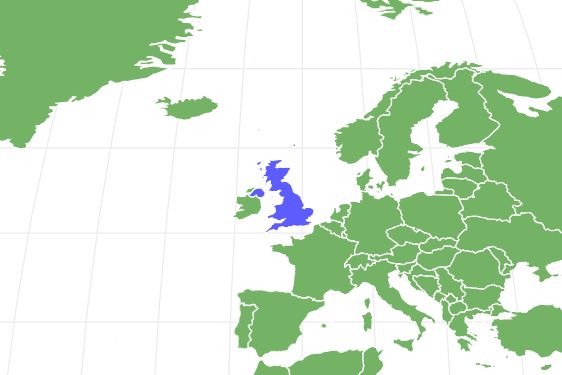Basset Hound
Canis lupus
Basset hounds have a stubborn streak that manifests as a charming personality trait!
Advertisement
Basset Hound Scientific Classification
- Kingdom
- Animalia
- Phylum
- Chordata
- Class
- Mammalia
- Order
- Carnivora
- Family
- Canidae
- Genus
- Canis
- Scientific Name
- Canis lupus
Read our Complete Guide to Classification of Animals.
Basset Hound Conservation Status
Basset Hound Facts
- Fun Fact
- Basset hounds have a stubborn streak that manifests as a charming personality trait!
- Temperament
- Friendly but stubborn
- Training
- Should be trained in obedience from an early age due to their stubborn nature
- Diet
- Omnivore
- Average Litter Size
- 8
- Common Name
- Basset Hound Dog
- Slogan
- Forget the training when not rewarded!
- Group
- Hound
Basset Hound as a Pet:
- General Health
- Energy Level
- Shedability
- Trainability
- Intelligence
- Tendency to Chew
- Size
- Family and kid friendliness
- Yappiness / Barking
- High
- Separation Anxiety
- High
- Preferred Temperature
- Average climate
- Exercise Needs
- Moderate
- Friendly With Other Dogs
- High
- Pure bred cost to own
- $1,000 - $10,000
- Dog group
- Hound
- Male weight
- 40-80 lbs
- Female weight
- 40-60 lbs
This post may contain affiliate links to our partners like Chewy, Amazon, and others. Purchasing through these helps us further the A-Z Animals mission to educate about the world's species.
View all of the Basset Hound images!
Basset hounds have a stubborn streak that manifests as a charming personality trait. Although they are obedient, you should expect your basset hound to express themselves by sighing or even attempting to participate in your family’s conversations
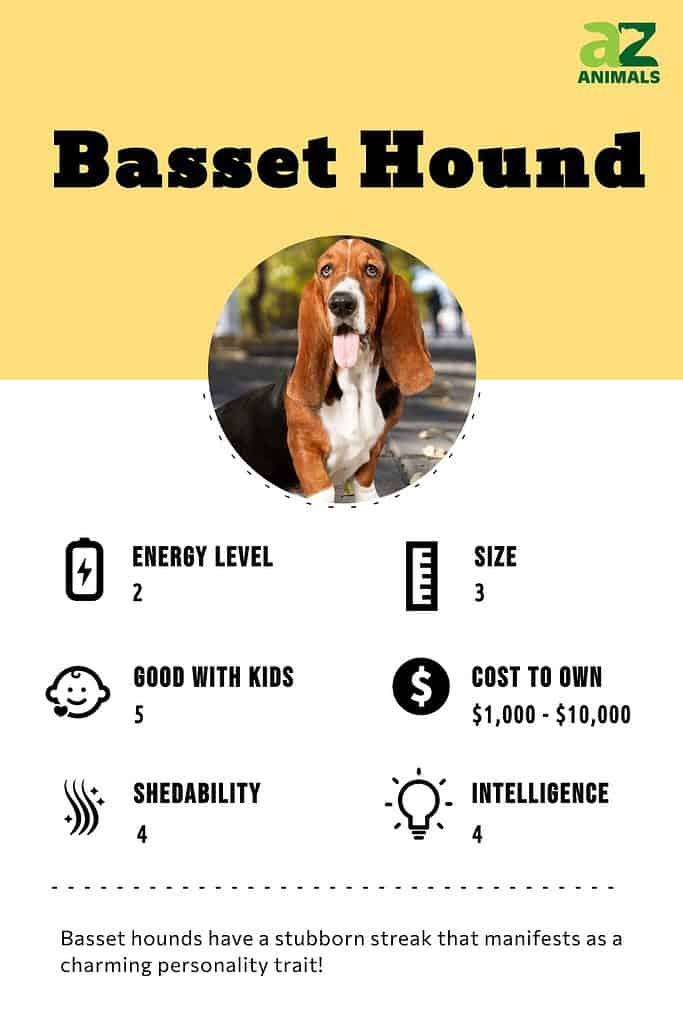
With sweet personalities and charming faces, basset hounds are a beloved part of modern culture. Bassets originated in France; although their predecessors have been around since the 6th century, the first real basset-type hounds appeared in the late 1800s. Today, they are found across Europe and the United States.
See all of our expert product reviews.
These gentle dogs make a great addition to the family, but they suffer from serious separation anxiety and don’t do well when left home alone. These hounds are a good choice for large families who can afford to take care of these lovable but high-maintenance pets.
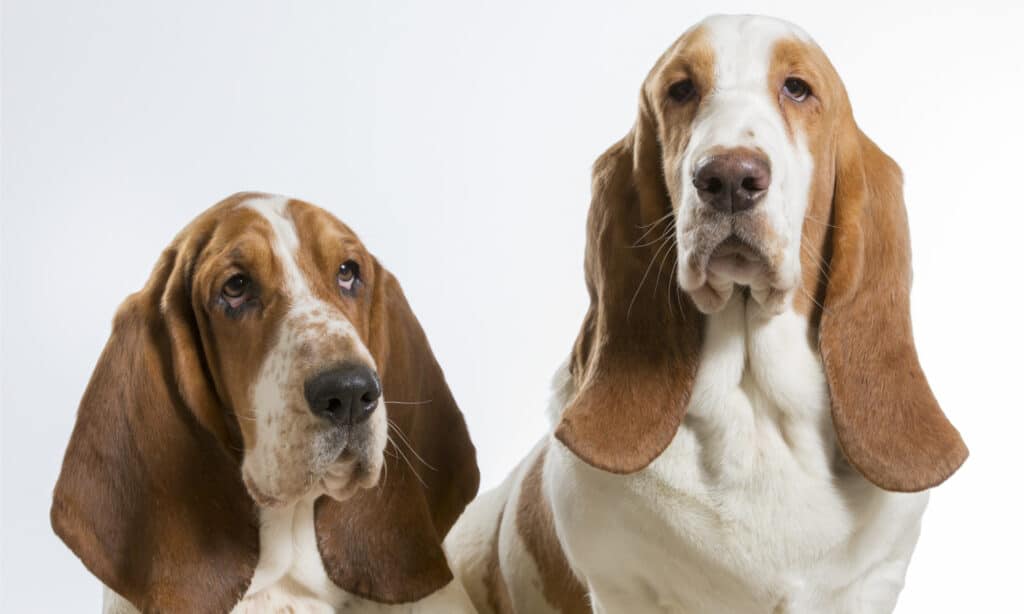
Basset hounds’ sensitive noses work more efficiently when they’re wet.
©Jne Valokuvaus/Shutterstock.com
3 Pros and Cons of Owning a Basset Hound
| Pros! | Cons! |
|---|---|
| Sweet and loving! Bassets are incredibly attached to their owners; yours will probably never want to leave your side. | Separation anxiety. Bassets get lonely, and when they get lonely, they are known to howl. Try not to leave your basset hound alone at home if you can help it. |
| Great with kids! These hounds are gentle enough to hang out with every member of the family, including kids and other pets. | Health issues. Basset hounds are susceptible to back and joint problems that get worse as they get older. Take your basset to the vet for regular checkups. |
| Engaging personality! Your basset will love to participate in family activities, especially if they are allowed to go at a slow and steady pace. | Food fixation. Bassets love to eat, but they have a hard time exercising. You will need to watch their diet to help your basset maintain a healthy weight. |
Evolution
Bassets are believed to have originated in the 6th century through the breeding program of the monks of the Benedictine Abby of St. Hubert. The monks maintained a dog breeding venture that brought revenue to the Abby by selling the dogs to European nobles and huntsmen. St Huberts Hounds were descended from the Laconian hound, a group of dogs discerned from Greek descriptions. Laconian hounds were renowned for never giving up their scent until they found their prey.
The dogs eventually known as Basset became popular in France after the revolution among regular people who didn’t hunt on horseback like the royals and country squires of the era. The dog’s short stature with its nose literally to the ground – made it a perfect hunting dog and pet.
Health and Entertainment for your Basset Hound
See all of our expert product reviews.
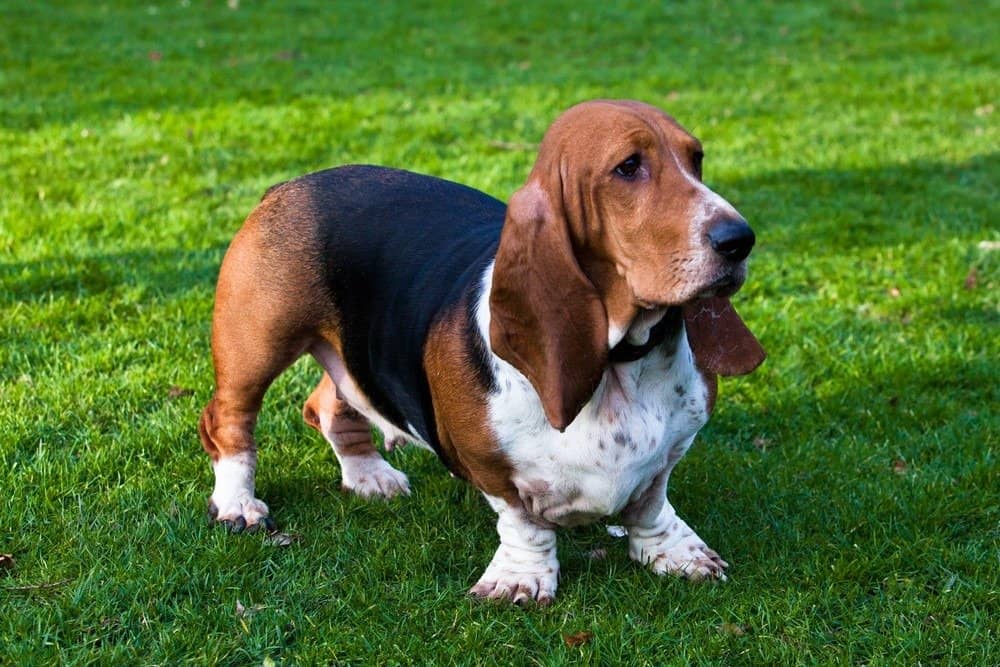
Fully-grown basset hounds weigh between 50-70 pounds.
©Ewa Studio/Shutterstock.com
Size and Weight
These hounds are medium-sized dogs with thick torsos and short stature. A fully-grown basset tends to weigh between 50-70 pounds. Males stand between 12 and 15 inches tall and can weigh as much as 80 pounds. Females are slightly smaller; they can grow up to 14 inches tall, and they usually weigh no more than 60 pounds. Babies start out incredibly small and may only weigh around 8 pounds by the time they are 8 weeks old.
| Height (male) | 12-15 inches |
| Height (female) | 11-14 inches |
| Weight (male) | 40-80 pounds |
| Weight (female) | 40-60 pounds |
Common Health Issues
These hounds have a comparatively short lifespan and are at major risk for several health conditions. Due to the structure of their torso, basset hounds are particularly prone to back, hip, and elbow problems – all of which can be seriously aggravated by obesity. They also have incredibly sensitive eyes and ears, which means that they may be subject to infections and other issues related to soft tissue. Finally, like other purebred dogs, basset hounds are at risk for von Willebrand’s disease, which can cause bleeding and clotting problems.
The best way to keep your dog healthy is to take them in for regular eye, ear, and joint exams. The conditions that your vet will check for include:
- Entropion and ectropion of the eyes
- Otitis externa in the ears
- Hip and elbow dysplasia
- Back injuries
- Gastric torsion
- Von Willebrand’s disease
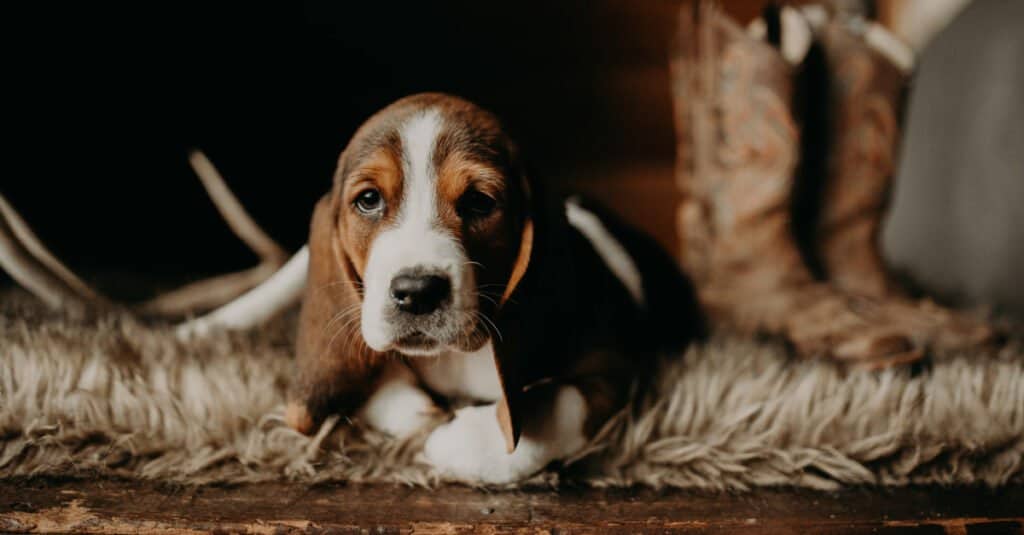
Bassett hounds make for a great family pet because of their demeanor with children.
©iStock.com/Jessica Nystrom
Temperament
These dogs are sweet, gentle, intelligent, and stubborn pets. They have incredibly loving personalities and mesh with nearly any family that they are introduced to. Bassets are known for their intelligent behavior and gentle temperament; they tolerate children, and they usually get along well with other pets. However, most basset hounds are also known for having a stubborn streak that can make training difficult, especially if they are not introduced to basic commands as a pup.
One of the most important things to realize about these dogs is that they are incredibly prone to separation anxiety. Your basset will see himself as your best friend, and he will become incredibly worried if he is left at home alone. Expect to spend plenty of time with your dogs, and look forward to enjoying his intelligent and lively personality.
How to Take Care of a Basset Hound
Basset hounds are domestic dogs that prefer to stay right by their owner’s side. Your dog will need daily walks and a moderated diet to prevent obesity. You should also plan on taking your basset to the vet for regular checkups, especially if they have had any joint issues in the past. Finally, remember that puppies need to be trained from a young age to help them learn commands despite their stubborn streak.
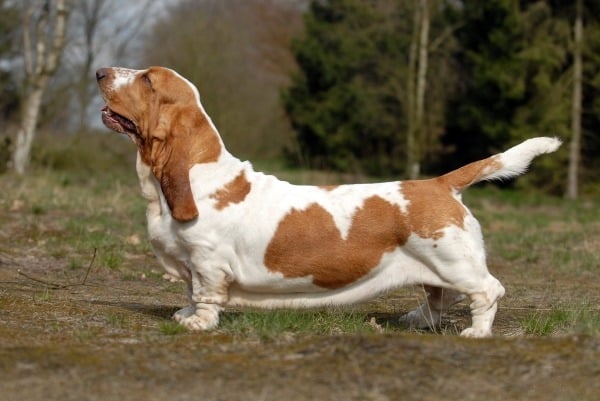
Basset hounds are prone to weight gain.
©Bonnie van den Born, http://www.bonfoto.nl, Cwazi at nl.wikipedia, CC BY-SA 3.0, via Wikimedia Commons – License
The Best Dog Food for Bassett Hounds
These dogs gain weight easily, but they have an incredibly hard time taking it off. This means that the best way to keep your basset hound healthy is to watch its diet closely.
Your basset will be happiest on a diet that includes a high amount of protein and healthy fats and a low amount of carbohydrates. Dry kibbles can be a good choice, but watch out for the quality of the food; some kibbles simply contain far too many grains for a basset hound’s slow metabolism. Many basset hound owners prefer to feed their dogs a mix of either cooked or raw meat combined with vegetables. Always consult with your vet to determine a good balance for your basset’s ideal weight.
When we account for their specific health needs, A-Z Animals believes the best dog food for Bassett Hounds is Wellness CORE Digestive Health Dry Dog Food with Wholesome Grains, Real Meat & Brown Rice, Sensitive Stomach Dog Food, Easily Digestible.
This quality kibble is coated with digestive enzyme probiotics for assisted digestion since Bassett Hounds can suffer from bloat/gastric torsion and other complications. The prebiotic fiber and wholesome protein from fish are good for weight control because your dog will know when it’s full. Plus, the quality proteins are a great natural source of glucosamine to nourish this breed’s joints. Additionally, Omega-3s are good for the immune system and have anti-inflammatory properties that may help with otitis external.
Check Chewy or Amazon for this product.
Babies need more food than adults; depending on their age, they may want to eat as many as three times a day. Be aware that these hounds can develop a food fixation. To combat this, get them used to a regular feeding schedule from a young age.
Maintenance and Grooming
These dogs are short-haired dogs, so they don’t need to go to the groomer very often. However, because they shed a lot, you should still brush your basset with a mitt or a washcloth at least once every few days. Basset hounds also have a lot of wrinkles; to keep them healthy, give them a bath at least once a month. Use a gentle soap to avoid irritating your basset’s sensitive skin.
The signature droopy ears of these dogs are unfortunately prone to infections. Inspect and clean their ears regularly. Your vet will prescribe an appropriate cleaning mix to keep major issues at bay.
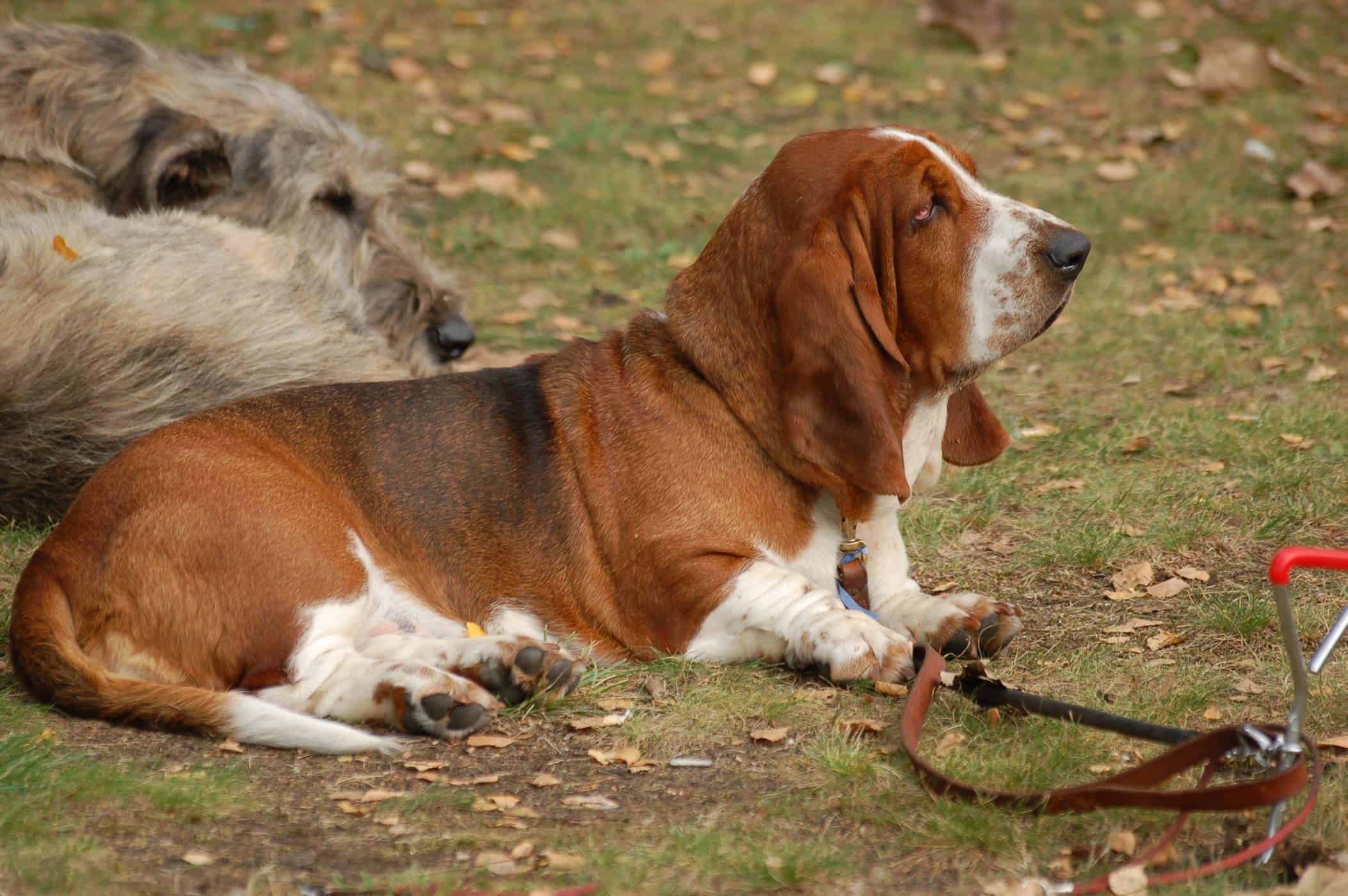
Basset hounds on a healthy diet can get by with one walk a day.
©Lilly M, CC BY-SA 3.0, via Wikimedia Commons – License
Training
These hounds are intelligent, but they are also stubborn. The result is a dog who is capable of learning commands but who may need to be convinced to participate in activities. For best results, start training your dog as young as possible, and make sure to use positive reinforcement throughout the process. Most basset hounds have no problem learning essential commands after only a few training sessions.
Exercise
These dogs need a moderate amount of exercise. As long as they are on a healthy diet, a single daily walk should be enough to help prevent obesity. Older dogs are especially prone to joint problems, so don’t push them to exercise past their natural limits. In general, your basset hound will be happiest if they are allowed to take extended walks at a leisurely but enthusiastic pace.
Puppies
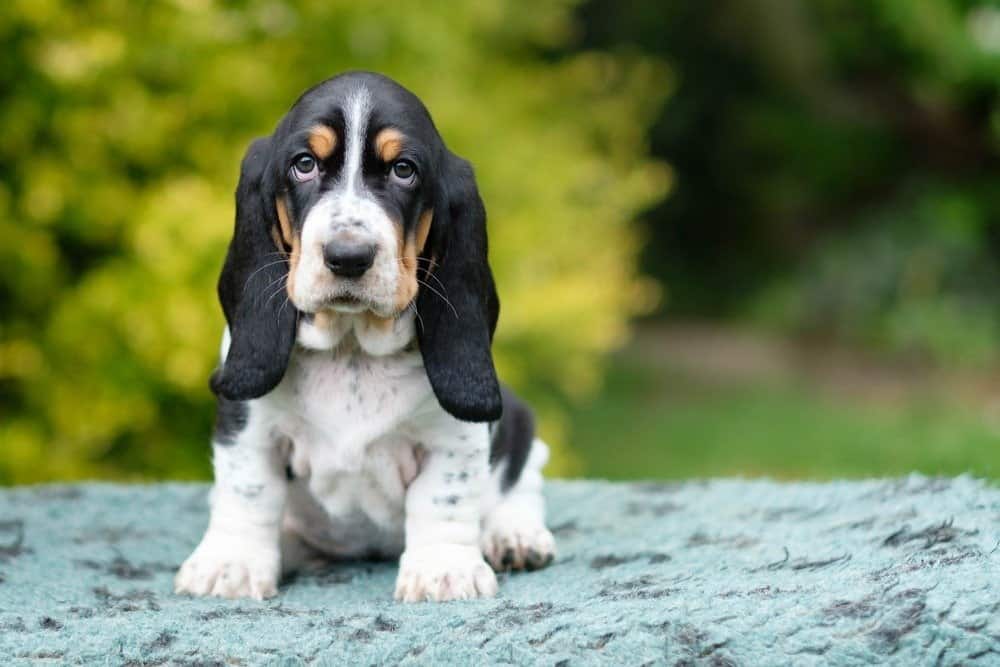
It is best to train basset hounds as puppies as they grow more stubborn as they age.
©Jon Buscall/Shutterstock.com
Basset puppies are sweet and energetic. Because basset hounds develop health problems as they get older, your puppy will want to get as much running and playing done as possible. Remember to start training your dog while they are young; that way, they will already know their basic commands when they inevitably decide to express their unique personality.
Basset Hounds and Children
These dogs get along incredibly well with children and make great family pets. However, because they are prone to back problems and have incredibly sensitive faces, it’s not a good idea to leave your basset alone with unsupervised toddlers. Never let a child sit on or otherwise place pressure on your basset hound’s back.
Dogs Similar to Basset Hounds
These dogs are hunting dogs with gregarious personalities. Three of the most similar breeds to basset hounds include bloodhounds, American foxhounds, and beagles.
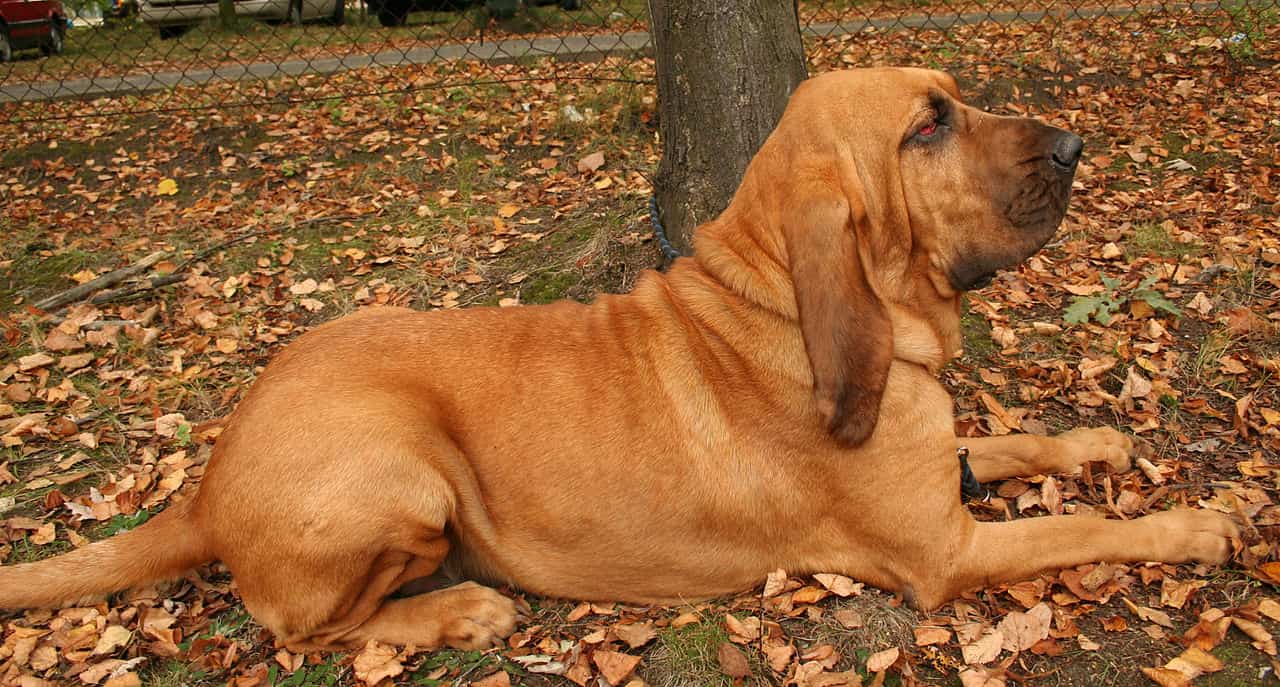
Bloodhounds have the droopy face of basset hounds but are much larger and more active.
©Pleple2000 / Creative Commons – License
- Bloodhounds – The bloodhound is a classic hunting dog with a droopy face and luxurious copper fur. Bloodhounds have longer legs than basset hounds and are more suited to an active lifestyle.
- American Foxhounds – Originally bred by George Washington, this patriotic hunting dog has short fur, long legs, and incredibly bright eyes.
- Beagles – These small hunting dogs have vivacious personalities and a high amount of energy. Beagles tend to be healthier than basset hounds and have longer lifespans.
Popular Names for Basset Hounds
Popular names for these dogs include:
- Guinness
- Sparky
- Daisy
- Darling
- Penny
- Chester
- Roger
- Susie
- Copper
- Marley
- Jasper
- Lola
- Bailey
Famous Basset Hounds
The basset hound is an iconic part of popular culture. Expect to see basset hounds featured frequently as sidekicks in movies, television shows, and comic strips. Some famous examples include Arthur from “Our House,” Cynthia from “Green Acres,” and Droopy Dog.
In real life, the most famous basset hound is probably Mr. Jeffries, a basset hound from England who holds the world record for having the biggest ears. Mr. Jeffries’ ears measure an impressive length of 11.49 inches.
View all 285 animals that start with BBasset Hound FAQs (Frequently Asked Questions)
How much do basset hounds cost to own?
Basset hounds are expensive to purchase and even more expensive to take care of. Expect to spend anywhere from $1,000 to $10,000 on a purebred basset hound. You should also plan to take them in for seasonal vet visits, pay for high-quality dog food, and purchase important supplies like ear cleaning solution. Be prepared to pay for at least one joint surgery across the course of your basset hound’s life.
Are basset hounds good with kids?
Basset hounds are incredibly good with kids, but kids may not always be good with basset hounds. Keep an eye on any interactions to make sure that the children are not pulling on your dog’s ears or putting unnecessary pressure on their back.
Are basset hounds good pets?
Basset hounds are wonderful pets, especially if you have time to spend with them. Be aware that basset hounds are prone to separation anxiety and have a tendency to howl if they are left at home alone. A basset hound mix may not be as anxious, but they can still be loud if left unattended.
Are basset hounds lazy?
As basset hounds get older, they tend to suffer from joint problems that can impact their mobility. Because of this, most basset hounds prefer to lead a slow but engaging lifestyle.
Are basset hounds high maintenance?
Basset hounds are easy to take care of, but they do require a moderate amount of maintenance. Expect to spend plenty of time engaging with your pet, and remember to clean their ears on a regular basis.
What health problems do basset hounds have?
Basset hounds tend to suffer from problems in their backs, hips, and knees. They are also prone to obesity, which can exacerbate all of the previous issues. Finally, basset hounds are at risk for eye and ear infections and require regular care and attention.
How long do basset hounds live?
Basset hounds have moderately long lifespans and tend to live to be about 15 years old.
Is there a miniature basset hound?
The miniature basset hound was created in 2007 by a breeder named Juan Johnson. Miniature basset hounds are descended from basset hounds, but they are not the same breed.
Are Basset Hounds herbivores, carnivores, or omnivores?
Basset Hounds are Omnivores, meaning they eat both plants and other animals.
What Kingdom do Basset Hounds belong to?
Basset Hounds belong to the Kingdom Animalia.
What class do Basset Hounds belong to?
Basset Hounds belong to the class Mammalia.
What phylum to Basset Hounds belong to?
Basset Hounds belong to the phylum Chordata.
What family do Basset Hounds belong to?
Basset Hounds belong to the family Canidae.
What order do Basset Hounds belong to?
Basset Hounds belong to the order Carnivora.
What genus do Basset Hounds belong to?
Basset Hounds belong to the genus Canis.
What type of covering do Basset Hounds have?
Basset Hounds are covered in Hair.
How many babies do Basset Hounds have?
The average number of babies a Basset Hound has is 8.
What is an interesting fact about Basset Hounds?
Basset Hounds forget the training when not rewarded!
What is the scientific name for the Basset Hound?
The scientific name for the Basset Hound is Canis lupus.
What is the difference between a beagle and a Basset Hound?
Both the beagle and the basset hound are tricolor hunting breeds and are about the same size. However, despite their similarities, there are an equal amount of differences to help set them apart. For instance, despite having the same shoulder height, the basset hound has an entirely different body proportion than the beagle. The basset hound is also about 46 to 89 percent heavier than the largest beagle. Due to their reduced number of health conditions, however, beagles are expected to live longer than Basset Hounds.
What's the difference between an American and a European Basset Hound?
The European basset hound has a slightly droopier face compared to the American basset hound. However, besides a few more wrinkles, these dogs are essentially the same! It just depends on the place that they are born and bred!
Thank you for reading! Have some feedback for us? Contact the AZ Animals editorial team.
Sources
- Pet MD, Available here: https://www.petmd.com/dog/breeds/c_dg_basset_hound
- Dogtime, Available here: https://dogtime.com/dog-breeds/basset-hound#/slide/1
- Hill's Pet, Available here: https://www.hillspet.com/dog-care/dog-breeds/basset-hound
- American Kennel Club, Available here: https://www.akc.org/dog-breeds/basset-hound/
- Dog Breeds, Available here: https://dogbreedsfaq.com/european-dog-breeds/french-dog-breeds/basset-hound/
- VCA, Available here: https://vcahospitals.com/know-your-pet/dog-breeds/basset-hound
- Dog Breeds Expert, Available here: https://www.dog-breeds-expert.com/basset-hound.html

